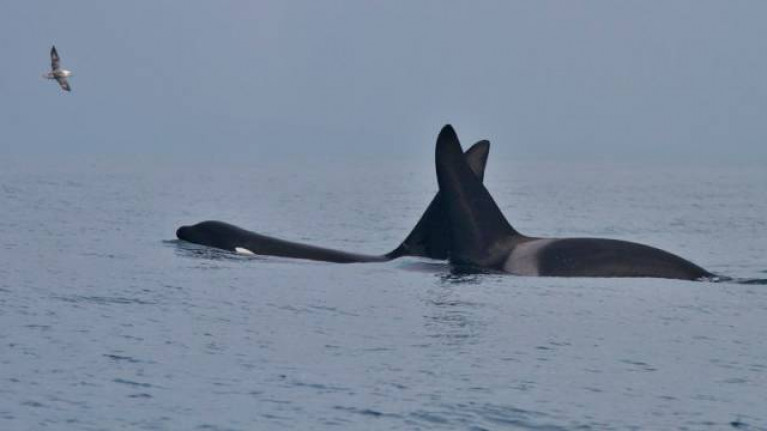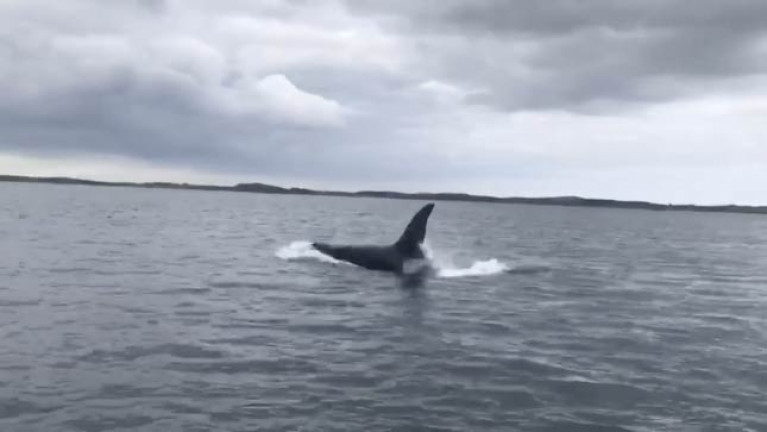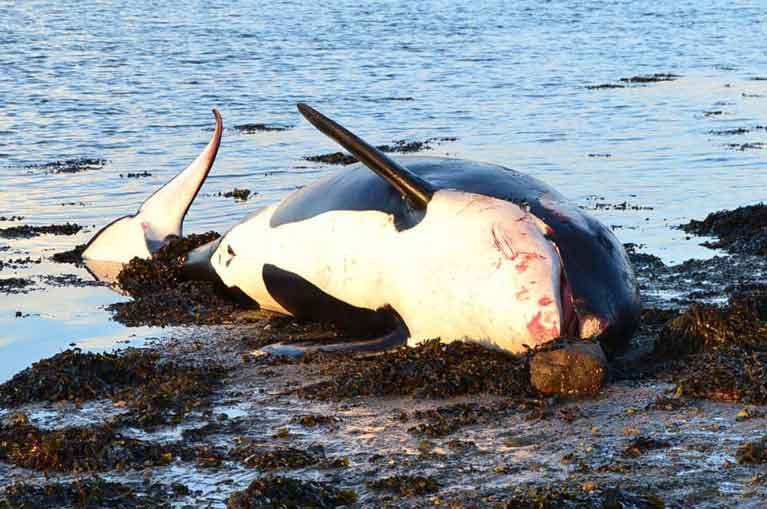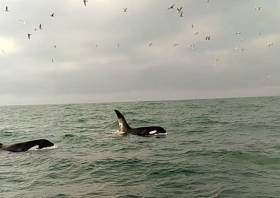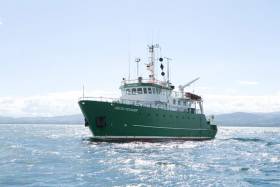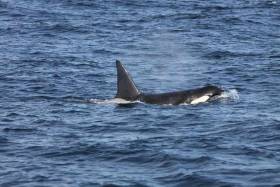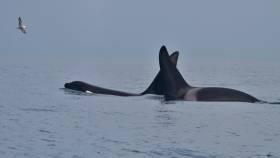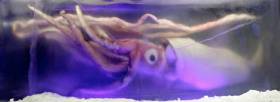Displaying items by tag: killer whales
Robin Knox-Johnston is Celebrity Hit For Iberian Killer Whales
Orca attacks on sailboats off Spain or Portugal - usually aiming for their rudders - are a matter of serious and increasing concern. Now the topic has been moved even further up the offshore passage-making agenda
with an assault on the 54ft personal sailing cruiser of sailing legend Robin Knox-Johnston, who has been at the forefront of international voyaging and racing ever since his non-stop voyage round the world 54 years ago with Suhaili in 1968-69. Then in a very long list of subsequent achievements, he held the round Ireland record from May to November 1986.
But as much as he’s accomplished in the offshore world, he recently crossed something new off his 83-year-old list. He just got attacked by the sea life he has spent a lifetime sailing above. He explained in
International Scuttlebutt:
"On November 24 at 0835 GMT off the Spanish coast of Cape Finisterre (Lat 42 53.6N Long 009 30.3W), a pod of 7-10 Orcas surrounded my Farr 56 Sanjula and then began to barge into her rudder. This eventually broke a steering connecting rod.
The engine was switched off, and the boat lay hove-to whilst the emergency steering was rigged. After ten minutes, the Orcas moved away, no longer finding a hove-to yacht interesting ... but that is only an assumption. The boat sailed to Vigo for repairs.
No one can explain these sudden spates of attacks. A yacht was rammed and holed, then sank 3-4 weeks ago, and who wants to be in a liferaft with large aggressive Orcas about?
Also known as killer whales, they are not considered a threat to humans, though the past few years have seen their disdain for sailboats. With a mature length of up to 26-feet and a weight of 8,000 pounds, they win the battle".
A pair of killer whales from a unique group have been sighted off the Kerry coast, as Radio Kerry reports.
The Irish Whale and Dolphin Group (IWDG) has identified the two male orcas seen off Bray Head on Valentia Island this week as the last known surviving members of the Scottish West Coast Community Group.
And according to the Mirror, it marks the second sighting for the pair in this area within the last three months.
Studied for years by marine scientists due to isolation their genetic distinctiveness from other orcas in the North Atlantic region, these marine mammals commonly feed in the Hebridean Islands.
Killer whales return to Bray Head, Valentia Island, Co. Kerry!
— Irish Whale and Dolphin Group (@IWDGnews) July 21, 2022
Thanks to Nicky Sheehan from Skellig Michael Cruises and Dr.Connie Kelleher for reporting their sightings to us.These sightings provide insight into how killer whales forage both in Irish coastal waters and elsewhere. pic.twitter.com/9AdtWrS72P
But they’ve previously been found as far as Scotland’s east coast, Lough Swilly in Donegal and four years ago off the Blasket Islands, likely in search of food.
Experts have feared for some time that this orca pod has been nearing its end. It last calved more than 30 years ago and has shrunk from around 20 individuals in the 1980s to just two known members, John Coe and Aquarius, as of 2016.
NI Surfer’s Close Encounter With Killer Whales Off Donegal
A surfer from Northern Ireland got more than he bargained for when he was chased by a pod of killer whales off Donegal last week.
As the News Letter reports, Derry man Ryan Vail was catching waves off Culdaff on the Inishowen Peninsula last Friday (11 September) when he found himself surrounded by the orca pod consisting of two adults and three juveniles.
Orcas are a rare sight in Irish inshore waters, but the marine wildlife are no strangers to Donegal.
A pod resident in western Scotland has been spotted in Lough Swilly before, and more recently in Strangford Lough, but it has not calved in many years — suggesting these visitors may come from elsewhere.
“I’m well used to the water and have seen basking sharks, dolphins and porpoises, so I knew it definitely wasn’t one of them,” Ryan said.
“I knew what I was looking at, so I also knew I shouldn’t be this close! So, there was a wee bit of panic.”
And that panic only grew when one of the smaller orcas — “the size of a Transit van” — made an aggressive dash for Ryan on his board.
The News Letter has more on the story HERE.
Orca Killer Whales Spotted in Strangford Lough (VIDEO)
A pod of orcas or killer whales caused great excitement in Strangford Lough, County Down yesterday. As reported by BBC News NI, local skipper Richard Connor from Causeway Boats said that it may be unusual but not unheard of. It was the third time he had seen them in 22 years of skippering.
Biologist Suzanne Beck from the Agri-Food and Biosciences Institute said the group that was in the lough are part of the West Coast community and may be seen a few times a year. "Usually they might travel on round the coast and the guys in the Hebrides might get a sighting and later they may travel right round Ireland, so you do hear of them every so often. They're just doing this circuit around us the whole time and it's only when they come close to the coast that we're getting these lucky sightings” They could have come in to chase a seal or been interested in different noises, but the concern was that they may keep travelling up through the Lough.
According to the Irish Whale and Dolphin Group NI they were initially reported yesterday afternoon several miles off Ardglass on the County Down coast before they pushed north into Strangford Narrows. “We can confirm from the presence of the bull known as "John Coe" that they are from the Scottish West Coast Community Group, which today has a core group of just seven or eight remaining individuals. They are recorded most years on a few occasions in Irish waters and this is the eighth time this apex predator has been recorded along the Co. Down coast since 2001. This is however not the first time killer whales have entered Strangford Narrows as a pod of four were photographed on Regatta Day off Portaferry on Aug. 18th 1962”. It was an exciting sight for children.
The McCarthy family got wind it was happening from the Irish Whale and Dolphin Group NI's Facebook page and decided to take a quick detour. “When we arrived, they were on the turn back and there were three boats near them”, Mr McCarthy said. I was concerned that it could turn into an awkward situation if they didn't find their way out through the Narrows but they seemed to make their way back fairly comfortably". He said the three boats out with them "did a good job of holding back". "It was a stunning night and what a treat," he added.
Killer Whales Absorbing Cocktail of Heavy Pollutants - New Study
Flame retardants, pesticides and other pollutants are among the toxic ingredients found in four killer whales stranded on the Irish coastline, according to a new study writes Lorna Siggins
Blubber samples analysed by scientists from Galway-Mayo Institute of Technology (GMIT) and the Marine Institute showed that the marine mammals concentrate persistent pollutants to “very high levels”.
The samples were taken from three killer whales stranded in Galway, Mayo and Waterford between 2010 and 2017 - one of which was pregnant with a near term foetus that was also sampled.
The study showed bio-accumulation of 16 polychlorinated biphenyls (PCBs), seven brominated flame retardants and 19 organochlorine pesticides, according to results published in the Marine Pollution Bulletin.
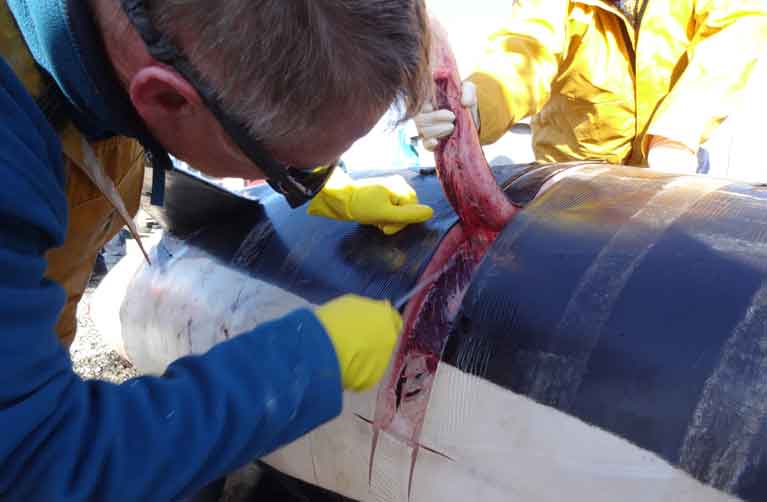 Collecting blubber sample from killer whale for contaminant analysis
Collecting blubber sample from killer whale for contaminant analysis
Concentrations of PCBs in one killer whale, stranded at Doohoma, Co Mayo, exceeded the suggested toxicity threshold of 17mg/kg, the authors state.
GMIT PhD student and senior author Moira Schlingermann noted that “although these concentrations are high, these results are relatively low from a global perspective, particularly in comparison to the highly contaminated transient killer whales from coasts along the north-east Pacific Ocean”.
“These contaminants are known as legacy pollutants as they were produced decades ago but still persist in our marine waters,” she said.
“ We are also interested in “emerging” pollutants, new chemicals that have only recently been designed and released into our environment and for which we do not know their effects,”she said.
“Persistent pollutants continue to be of major concern for marine apex predators such as killer whales and it is vital that they are continually monitored and reported in order to add to the knowledge of pollutants across the entire range of this species,” she said.
Dr Philip White of GMIT supervised much of the work with Dr Brendan McHugh from the Marine Institute and it was conducted at the institute laboratories in Oranmore, Co Galway.
“We have to do everything we can to prevent these substances from entering the marine environment"
Dr Simon Berrow, co-supervisor at GMIT and Irish Whale and Dolphin Group chief executive had warned of the “dire future” facing killer whales last year.
“The build-up of persistent pollutants and their effects on these animals reproduction are undoubtedly the biggest long term threat they and species of dolphin and porpoise face in our oceans,” Dr Berrow said.
“We have to do everything we can to prevent these substances from entering the marine environment and the food chain, because once in it, they will be almost impossible to remove,” he said.
This work was conducted under a GMIT RISE studentship, which was part-funded by the IWDG.
For access to the publication in the Marine Pollution Bulletin visit:
Killer Whales Spotted Off Dublin Coast May be Same That Visited Blasket Islands Earlier This Year
#MarineWildlife - Video posted on social media over the weekend of two killer whales spotted off the Co Dublin coast has gone viral.
Trawlerman James Mac Cluskey used his phone to record a few seconds’ glimpse of the pair of male orcas, which came close to his boat some 8km off Rockabill on Saturday afternoon (17 November).
According to the Irish Whale and Dolphin Group (IWDG), it’s the second sighting of the largest species in the dolphin family off the East Coast in recent weeks, with another fisherman reporting an encounter some 22km off Skerries on 30 October.
And it’s believed the duo may be part of the Scottish West Coast Community Group, a unique orca pod long under threat of extinction owning to not having produced any calves for years.
Earlier this year, whales from this group were identified feeding off the Blasket Islands in Co Kerry, showing just how far their range extends.
‘Operation Orca’ Set To Survey Scottish Killer Whales On Celtic Voyager
#MarineWildlife - The RV Celtic Voyager departed the Port of Cork yesterday (Wednesday 24 October) for ‘Operation Orca’, a 12-day survey of an offshore killer whale community associated with the Northeast Atlantic mackerel fishery.
A team of marine scientists from University College Cork is on board the research vessel that’s headed to waters east of the Orkneys, to study the orcas that feed on mackerel between October and February each year.
“This is the first time a dedicated research vessel will be heading up to study these killer whales and we are hopeful to come back with a lot of data,” said PhD researcher and chief scientist Róisín Pinfield in her introductory blog for the survey.
“We will have cameras, GoPros, drones, underwater hydrophones collecting acoustic data so we can hear the killer whales and a RIB so we can get in close if weather conditions allow. Time to pray to the weather gods to keep the storms away!”
The Scientists@Sea blog will be regularly updated by the Celtic Voyager team once they reach the fishing grounds and begin their survey, which runs till Sunday 4 November.
Killer Whales Future Threatened By Human Waste
The prognosis for killer whales in Europe is dire, according to the Irish Whale and Dolphin Group.
There was great excitement and media interest in the sighting of killer whales off West Kerry over a month ago. The IWDG has identified them as what is known as the Scottish West Coast Community of killer whales. It has recorded them previously in Irish waters, from County Antrim, to Cork and from Co Kerry to Mayo.
But that group of whales may soon become extinct and that is a warning over the way in which marine waters are being abused as a sink for human waste. The warning has been given by the Chief Scientific Officer of the Irish Whale and Dolphin Group, Dr.Simon Berrow, speaking to Tom MacSweeney on his THIS ISLAND NATION radio programme. Listen to the clip below.
#MarineWildlife - Two killer whales spotted feeding off the Blasket Islands earlier this week have been identified as members of a unique pod from Scotland.
“Killer whale sightings in any Irish waters are rare events, and they seem to be getting rarer,” said Pádraig Wholley of the Irish Whale and Dolphin Group, whose member Nick Massett photographed the orcas in Dingle Bay on Monday 5 March.
Massett identified one of the two cetaceans immediately as John Coe, and its partner as another adult male, Aquarius. RTÉ News says the orcas were likely hunting seals in the area.
Both are members of the genetically distinctive Scottish West Coast Community Group, which commonly feeds in the Hebridean Islands but has previously been found as far as Lough Swilly and Scotland’s east coast, likely in search of food.
“Colleagues from the Hebridean Whale & Dolphin Trust can confirm that John Coe was seen exactly seven days [previously] in Scottish waters … which tells us a lot about the movements of this highly mobile apex predator,” said Wholley.
The Scottish West Coast Community Group has been feared to be on the ‘brink of extinction’ for many years. In January 2016 the pod lost a female member, Lulu, due to what was at first thought to be entanglement with fishing gear but was later blamed on PCB pollution.
Kerry Trawler Lands Second Giant Squid In As Many Months
#MarineWildlife - Once was exciting enough — but a Kerry trawler had landed a second giant squid in as many months, as RTÉ News reports.
Local fisherman Pete Flannery landed what was the first giant squid recorded in Irish waters for 22 years in mid May, as previously reported on Afloat.ie.
But amazingly, he had repeated the feat this month while trawling in the same area, on the Porcupine Bank west of Dingle.
Before this year, only five of the enormous cephalopods had been found in Irish waters since records began in 1673.
What’s more, two of those squid were landed by Flannery’s own father Michael back in 1995.
“I'll probably have to catch a third now so that I can have bragging rights,” Flannery told RTÉ News, which has more on the story HERE.
Another Giant Squid landed in Dingle. Only 7th recorded in Ireland in 350 years. Amazingly 4 have been caught by Flannery family! @rtenews pic.twitter.com/1gWBYZr045
— Seán Mac an tSíthigh (@Buailtin) July 18, 2017
Elsewhere, a Galway man recorded video of a killer whale carcass washed up on the shore near Roundstone in Connemara.
Independent.ie reports that the orca sighting was confirmed by the Irish Whale and Dolphin Group, whose Mick O’Connell said the species is “neither common nor very rare [but] you wouldn’t see then very often.”
Ireland’s North Coast is a regular haunt for an “evolutionary significant” pod of killer whales that has been under threat for years due to its lack of young.


























